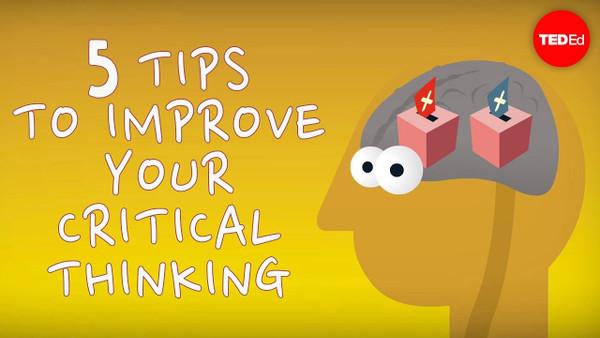5 tips to improve your critical thinking - Samantha Agoos
Curated from: TED-Ed
Ideas, facts & insights covering these topics:
14 ideas
·1.11K reads
3
Explore the World's Best Ideas
Join today and uncover 100+ curated journeys from 50+ topics. Unlock access to our mobile app with extensive features.
Enhancing Your Critical Thinking Skills
Critical thinking is an essential skill in today's complex world, enabling people to analyze information, make informed decisions, and solve problems effectively. These tips serve as a foundation for developing a more analytical mindset, fostering better decision-making, and promoting intellectual growth.
24
150 reads
1. Formulate Clear Questions
The first step to critical thinking is asking clear, specific questions. Without a focused inquiry, our thinking can easily become scattered and unfocused. This involves defining the problem or issue at hand accurately. By asking the right questions, individuals can narrow down the scope of their inquiry and focus on relevant aspects. Clear questions help in guiding the thought process and setting a direction for investigation, ensuring that the analysis remains on track and relevant.
23
110 reads
2. Gather Relevant Information
Once the right questions are formulated, the next crucial step is gathering pertinent information. It's important to source data from credible and diverse references to build a well-rounded perspective. Critical thinkers do not rely solely on one source or accept information at face value; they seek out multiple viewpoints and data points to cross-verify facts and avoid biases.
23
83 reads
3. Evaluate the Evidence
After collecting information, the evaluation of evidence becomes vital. Critical thinkers must assess the reliability and relevance of the evidence before accepting it as truth. This involves scrutinizing the source's credibility, identifying any potential biases, and determining whether the evidence supports or contradicts the argument being considered.
23
70 reads
23
59 reads
4. Consider Different Perspectives
A key component of critical thinking is the ability to consider different perspectives. Agoos highlights the importance of stepping outside one's viewpoint to understand other positions and arguments. This openness to diverse opinions fosters empathy and enhances the ability to see the bigger picture, which is essential for comprehensive analysis.
24
52 reads
5. Reach Well-Reasoned Conclusions
The final step in enhancing critical thinking is reaching well-reasoned conclusions based on the evidence and analysis conducted. Synthesize the information gathered and evaluate it in light of their initial questions. A well-reasoned conclusion is not merely an opinion but a logical deduction that follows from careful analysis and consideration of all relevant factors.
23
45 reads
Conclusion
Improving critical thinking skills is an ongoing process that requires dedication and practice. By following Samantha Agoos's five tips—formulating clear questions, gathering relevant information, evaluating the evidence, considering different perspectives, and reaching well-reasoned conclusions—individuals can develop a more analytical approach to problem-solving and decision-making. These skills are invaluable in navigating the complexities of today's world, fostering a mindset that values evidence-based reasoning and thoughtful analysis over impulsive judgments.
23
41 reads
Bonus tips
Take time each day to practice mindfulness, whether through meditation, journaling, or simply sitting quietly and observing your thoughts.
Cultivate a mindset of curiosity and openness.
Regularly ask yourself questions like, "Why do I believe this?" or "What evidence supports my conclusion?"
Actively seek out information and perspectives that challenge your assumptions.
Practice creating structured arguments with clear premises and conclusions. Analyze the arguments of others by identifying their main points, evaluating the evidence provided, and checking for logical consistency.
23
41 reads
IDEAS CURATED BY
CURATOR'S NOTE
Discussing the key points from Samantha Agoos's video titled "5 Tips to Improve Your Critical Thinking."
“
Similar ideas
6 ideas
4 ideas
10 ideas
Read & Learn
20x Faster
without
deepstash
with
deepstash
with
deepstash
Personalized microlearning
—
100+ Learning Journeys
—
Access to 200,000+ ideas
—
Access to the mobile app
—
Unlimited idea saving
—
—
Unlimited history
—
—
Unlimited listening to ideas
—
—
Downloading & offline access
—
—
Supercharge your mind with one idea per day
Enter your email and spend 1 minute every day to learn something new.
I agree to receive email updates










